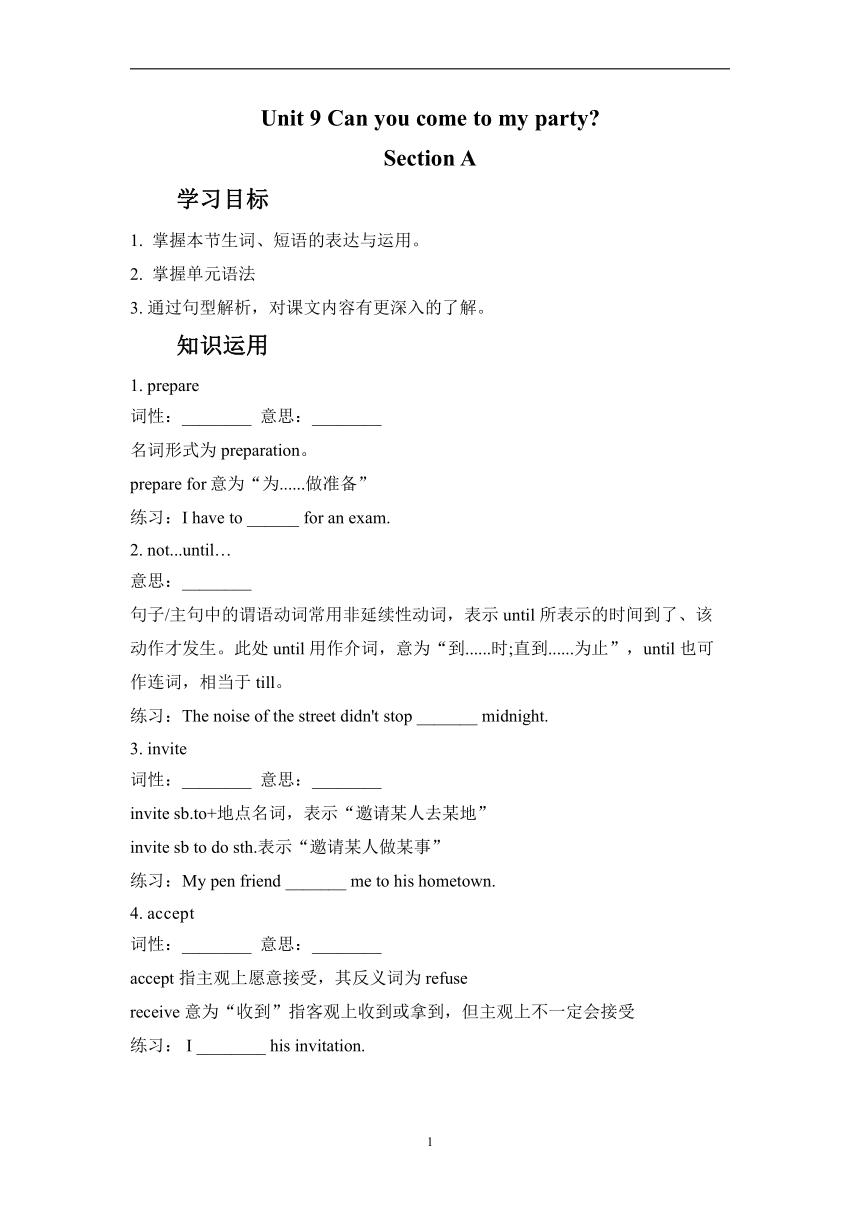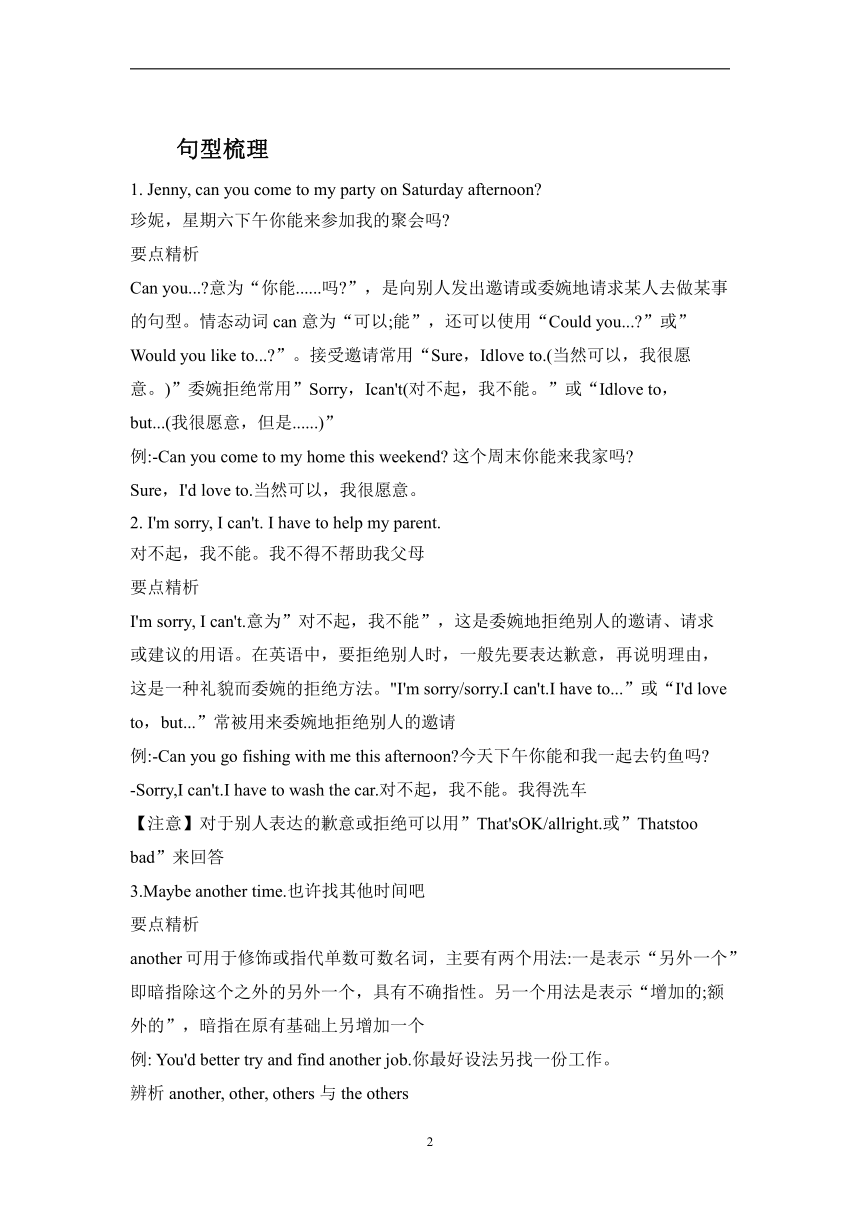Unit 9 Can you come to my party?Section A 学案 人教版八年级上册(含解析)
文档属性
| 名称 | Unit 9 Can you come to my party?Section A 学案 人教版八年级上册(含解析) |

|
|
| 格式 | docx | ||
| 文件大小 | 28.2KB | ||
| 资源类型 | 教案 | ||
| 版本资源 | 人教新目标(Go for it)版 | ||
| 科目 | 英语 | ||
| 更新时间 | 2023-11-23 00:00:00 | ||
图片预览


文档简介
Unit 9 Can you come to my party
Section A
学习目标
掌握本节生词、短语的表达与运用。
掌握单元语法
3. 通过句型解析,对课文内容有更深入的了解。
知识运用
1. prepare
词性:________ 意思:________
名词形式为 preparation。
prepare for意为“为......做准备”
练习:I have to ______ for an exam.
2. not...until…
意思:________
句子/主句中的谓语动词常用非延续性动词,表示until 所表示的时间到了、该动作才发生。此处 until 用作介词,意为“到......时;直到......为止”,until 也可作连词,相当于 till。
练习:The noise of the street didn't stop _______ midnight.
3. invite
词性:________ 意思:________
invite sb.to+地点名词,表示“邀请某人去某地”
invite sb to do sth.表示“邀请某人做某事”
练习:My pen friend _______ me to his hometown.
4. accept
词性:________ 意思:________
accept 指主观上愿意接受,其反义词为 refuse
receive 意为“收到”指客观上收到或拿到,但主观上不一定会接受
练习: I ________ his invitation.
句型梳理
1. Jenny, can you come to my party on Saturday afternoon
珍妮,星期六下午你能来参加我的聚会吗
要点精析
Can you... 意为“你能......吗 ”,是向别人发出邀请或委婉地请求某人去做某事的句型。情态动词can 意为“可以;能”,还可以使用“Could you... ”或”Would you like to... ”。接受邀请常用“Sure,Idlove to.(当然可以,我很愿意。)”委婉拒绝常用”Sorry,Ican't(对不起,我不能。”或“Idlove to,but...(我很愿意,但是......)”
例:-Can you come to my home this weekend 这个周末你能来我家吗
Sure,I'd love to.当然可以,我很愿意。
2. I'm sorry, I can't. I have to help my parent.
对不起,我不能。我不得不帮助我父母
要点精析
I'm sorry, I can't.意为”对不起,我不能”,这是委婉地拒绝别人的邀请、请求或建议的用语。在英语中,要拒绝别人时,一般先要表达歉意,再说明理由,这是一种礼貌而委婉的拒绝方法。"I'm sorry/sorry.I can't.I have to...”或“I'd love to,but...”常被用来委婉地拒绝别人的邀请
例:-Can you go fishing with me this afternoon 今天下午你能和我一起去钓鱼吗
-Sorry,I can't.I have to wash the car.对不起,我不能。我得洗车
【注意】对于别人表达的歉意或拒绝可以用”That'sOK/allright.或”Thatstoo
bad”来回答
3.Maybe another time.也许找其他时间吧
要点精析
another可用于修饰或指代单数可数名词,主要有两个用法:一是表示“另外一个”即暗指除这个之外的另外一个,具有不确指性。另一个用法是表示“增加的;额外的”,暗指在原有基础上另增加一个
例: You'd better try and find another job.你最好设法另找一份工作。
辨析 another, other, others 与 the others
another 既可作形容词,也可作代词,可用于三个或更多的人或物,泛指同类事物中的三者或三者以上的”另个”,可修饰或代替单数可数名词
other 可作形容词或代词,作形容词时,意思是“别的,其他的”,泛指“其他的(人others 是 other的复数形式,泛指”另外几个,其余的”,在句中可作主语或宾语the others 意为”其他东西;其余的人”,特指某一范围内的“其他的 (人或物)”是the other的复数形式
语法讲解
情态动词can的用法
can 是情态动词,意为“能,会”,表示说话人的感情和语气,没有人称和数的变化,在句中不能单独作谓语,只能和它紧跟着的动词原形一起构成复合谓语。其用法如下:
1.表示能力,意为“能,会”。
例:Can you swim 你会游吗
2.表示请求或允许,多用于口语中,意为“可以,能”。
例: Can you go to the movies with me 你能跟我一起去看电影吗
3.表示推测,用于否定句或疑问句中。
例: That can't be true.那不可能是真的。
4.含can的肯定句变否定句的方法是直接在can 后加not,可缩写成can't或cannot。变一般疑问句时把 can 提前即可。
例:I can see some apples in the basket. 我能看到篮子里有一些苹果
I can't see any apples in the basket.我看不到篮子里有苹果
Can you see any apples in the basket 你能看到篮子里有一些苹果吗
[注意]
对于 Can you.. 的肯定回答可以用OK或 Certainly.等;回答可用No...或Sorry...等。
Can you look after my cat while I'm away
我不在的时候你能照顾我的猫吗
-OK.好的
辨析 can,may 与 could
can 是表示请求给予的最常用的词
may 表示以礼貌的方式请求许可。may 较正式
could 在表示许可时更加委婉
例:-Could I borrow your dictionary 我可以借你的字典吗
-Yes, you can/may/ could.可以。
[注意]
用 Can you/he/she/they... 向别人发出邀请或提出请求时,多用于熟人之间,比较随便。
例: Can they go to the concert 他们能去听音乐会吗
练习:
1. Nowadays, some robots are very human-like. They_____walk and dance.
A.can
B.must
C.need
D.have to
2.—Jack,let's play basketball!
—Sorry,I'm afraid I can't.My little sister is ill,I ______look after her.
A.might B.could C.must D.would
3.If you don't like the porridge, you ______ eat it. What about a glass of milk
A. shouldn’t B. mustn't C. don’t have to D. can’t
4.—Is there an express to Nanjing next week?
—There _____be one.But you'd better call the booking office to make sure.
A.might B.can C.will D.must
5.—In general, the new students are quite shy when he or she comes to a new situation, but he or she ________ be rather outgoing sometimes.
—I can’t agree with you more.
A. must B. can C. may D. should
答案
知识运用
prepare 2. until 3. invited 4. accepted
语法精讲
1.答案:A
解析:由第一句句意“现在,一些机器人非常像人”可知,空格所在句句意为“它们会走路和跳舞”。故选A。
2.答案:C
解析:might可能,could能、可以,must一定、必须,would将、会。根据题干中Sorry,I'm afraid I can't. My little sister is ill可知说话人告诉杰克他不能去打篮球,因为小妹妹生病了,他必须照顾她,则此处用must,符合题意。故选:C。
3.答案:C
解析:A不应该;B禁止;C不必;D不能;由空后建议“What about a glass of milk"(来杯牛奶怎么样)可知,是不喜欢粥就没必要喝粥。故选:C。
4.答案:A
解析:might可能;can能;will将会;must必须。根据但你最好打电话给订票处确认一下。可知,可能有去南京的快车,表示肯定推测用might。故选:A。
5.答案:B
解析:A.必须;B.会;C.可能;D.应该。根据In general, the new students are quite shy when he or she comes to a new situation, but he or she ______ be rather outgoing sometimes.可知是指总的来说,新生在来到一个新的环境时,他或她是很害羞的,但他或她有时也会很外向。故选:B。
2
Section A
学习目标
掌握本节生词、短语的表达与运用。
掌握单元语法
3. 通过句型解析,对课文内容有更深入的了解。
知识运用
1. prepare
词性:________ 意思:________
名词形式为 preparation。
prepare for意为“为......做准备”
练习:I have to ______ for an exam.
2. not...until…
意思:________
句子/主句中的谓语动词常用非延续性动词,表示until 所表示的时间到了、该动作才发生。此处 until 用作介词,意为“到......时;直到......为止”,until 也可作连词,相当于 till。
练习:The noise of the street didn't stop _______ midnight.
3. invite
词性:________ 意思:________
invite sb.to+地点名词,表示“邀请某人去某地”
invite sb to do sth.表示“邀请某人做某事”
练习:My pen friend _______ me to his hometown.
4. accept
词性:________ 意思:________
accept 指主观上愿意接受,其反义词为 refuse
receive 意为“收到”指客观上收到或拿到,但主观上不一定会接受
练习: I ________ his invitation.
句型梳理
1. Jenny, can you come to my party on Saturday afternoon
珍妮,星期六下午你能来参加我的聚会吗
要点精析
Can you... 意为“你能......吗 ”,是向别人发出邀请或委婉地请求某人去做某事的句型。情态动词can 意为“可以;能”,还可以使用“Could you... ”或”Would you like to... ”。接受邀请常用“Sure,Idlove to.(当然可以,我很愿意。)”委婉拒绝常用”Sorry,Ican't(对不起,我不能。”或“Idlove to,but...(我很愿意,但是......)”
例:-Can you come to my home this weekend 这个周末你能来我家吗
Sure,I'd love to.当然可以,我很愿意。
2. I'm sorry, I can't. I have to help my parent.
对不起,我不能。我不得不帮助我父母
要点精析
I'm sorry, I can't.意为”对不起,我不能”,这是委婉地拒绝别人的邀请、请求或建议的用语。在英语中,要拒绝别人时,一般先要表达歉意,再说明理由,这是一种礼貌而委婉的拒绝方法。"I'm sorry/sorry.I can't.I have to...”或“I'd love to,but...”常被用来委婉地拒绝别人的邀请
例:-Can you go fishing with me this afternoon 今天下午你能和我一起去钓鱼吗
-Sorry,I can't.I have to wash the car.对不起,我不能。我得洗车
【注意】对于别人表达的歉意或拒绝可以用”That'sOK/allright.或”Thatstoo
bad”来回答
3.Maybe another time.也许找其他时间吧
要点精析
another可用于修饰或指代单数可数名词,主要有两个用法:一是表示“另外一个”即暗指除这个之外的另外一个,具有不确指性。另一个用法是表示“增加的;额外的”,暗指在原有基础上另增加一个
例: You'd better try and find another job.你最好设法另找一份工作。
辨析 another, other, others 与 the others
another 既可作形容词,也可作代词,可用于三个或更多的人或物,泛指同类事物中的三者或三者以上的”另个”,可修饰或代替单数可数名词
other 可作形容词或代词,作形容词时,意思是“别的,其他的”,泛指“其他的(人others 是 other的复数形式,泛指”另外几个,其余的”,在句中可作主语或宾语the others 意为”其他东西;其余的人”,特指某一范围内的“其他的 (人或物)”是the other的复数形式
语法讲解
情态动词can的用法
can 是情态动词,意为“能,会”,表示说话人的感情和语气,没有人称和数的变化,在句中不能单独作谓语,只能和它紧跟着的动词原形一起构成复合谓语。其用法如下:
1.表示能力,意为“能,会”。
例:Can you swim 你会游吗
2.表示请求或允许,多用于口语中,意为“可以,能”。
例: Can you go to the movies with me 你能跟我一起去看电影吗
3.表示推测,用于否定句或疑问句中。
例: That can't be true.那不可能是真的。
4.含can的肯定句变否定句的方法是直接在can 后加not,可缩写成can't或cannot。变一般疑问句时把 can 提前即可。
例:I can see some apples in the basket. 我能看到篮子里有一些苹果
I can't see any apples in the basket.我看不到篮子里有苹果
Can you see any apples in the basket 你能看到篮子里有一些苹果吗
[注意]
对于 Can you.. 的肯定回答可以用OK或 Certainly.等;回答可用No...或Sorry...等。
Can you look after my cat while I'm away
我不在的时候你能照顾我的猫吗
-OK.好的
辨析 can,may 与 could
can 是表示请求给予的最常用的词
may 表示以礼貌的方式请求许可。may 较正式
could 在表示许可时更加委婉
例:-Could I borrow your dictionary 我可以借你的字典吗
-Yes, you can/may/ could.可以。
[注意]
用 Can you/he/she/they... 向别人发出邀请或提出请求时,多用于熟人之间,比较随便。
例: Can they go to the concert 他们能去听音乐会吗
练习:
1. Nowadays, some robots are very human-like. They_____walk and dance.
A.can
B.must
C.need
D.have to
2.—Jack,let's play basketball!
—Sorry,I'm afraid I can't.My little sister is ill,I ______look after her.
A.might B.could C.must D.would
3.If you don't like the porridge, you ______ eat it. What about a glass of milk
A. shouldn’t B. mustn't C. don’t have to D. can’t
4.—Is there an express to Nanjing next week?
—There _____be one.But you'd better call the booking office to make sure.
A.might B.can C.will D.must
5.—In general, the new students are quite shy when he or she comes to a new situation, but he or she ________ be rather outgoing sometimes.
—I can’t agree with you more.
A. must B. can C. may D. should
答案
知识运用
prepare 2. until 3. invited 4. accepted
语法精讲
1.答案:A
解析:由第一句句意“现在,一些机器人非常像人”可知,空格所在句句意为“它们会走路和跳舞”。故选A。
2.答案:C
解析:might可能,could能、可以,must一定、必须,would将、会。根据题干中Sorry,I'm afraid I can't. My little sister is ill可知说话人告诉杰克他不能去打篮球,因为小妹妹生病了,他必须照顾她,则此处用must,符合题意。故选:C。
3.答案:C
解析:A不应该;B禁止;C不必;D不能;由空后建议“What about a glass of milk"(来杯牛奶怎么样)可知,是不喜欢粥就没必要喝粥。故选:C。
4.答案:A
解析:might可能;can能;will将会;must必须。根据但你最好打电话给订票处确认一下。可知,可能有去南京的快车,表示肯定推测用might。故选:A。
5.答案:B
解析:A.必须;B.会;C.可能;D.应该。根据In general, the new students are quite shy when he or she comes to a new situation, but he or she ______ be rather outgoing sometimes.可知是指总的来说,新生在来到一个新的环境时,他或她是很害羞的,但他或她有时也会很外向。故选:B。
2
同课章节目录
- Unit 1 Where did you go on vacation?
- Section A
- Section B
- Unit 2 How often do you exercise?
- Section A
- Section B
- Unit 3 I'm more outgoing than my sister.
- Section A
- Section B
- Unit 4 What's the best movie theater?
- Section A
- Section B
- Unit 5 Do you want to watch a game show?
- Section A
- Section B
- Unit 6 I'm going to study computer science.
- Section A
- Section B
- Unit 7 Will people have robots?
- Section A
- Section B
- Unit 8 How do you make a banana milk shake?
- Section A
- Section B
- Unit 9 Can you come to my party?
- Section A
- Section B
- Unit 10 If you go to the party, you'll have a grea
- Section A
- Section B
